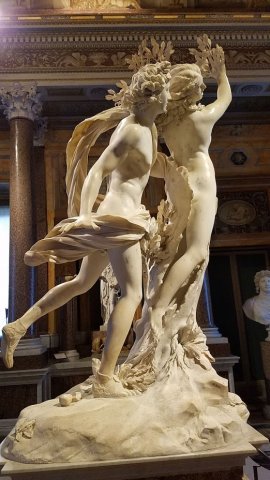It's funny how often when we react against something we nearly always throw the baby out with the bathwater.
Having had my cultural-formation years, and well as my Christian-formation years, steeped in Protestantism of the more Reformed sort, there were two things it never occurred to me to do: (1) show any particular respect for Mary, the mother of Jesus (except briefly, at Christmastime), and (2) read the Apocrypha—those writings from "between the Testaments" that are considered to be part of Holy Scripture by Catholics but not by Protestants. (I'm simplifying the situation somewhat.)
I think the greatest reason for the first was that Catholics make so much of Mary, often—or so it appears to Protestants—making her seem more important, and more venerated, than Jesus. To avoid that error, it was safest to ignore her. Plus there's no denying a certain historical bias against women. In more than one church of my experience, certain (male) saints are highly venerated, especially St. Paul. Also St. Peter, though he's a bit tainted because he's so important to Catholics. But Mary? Almost no mention at all, and very little honor paid. In fact, we once were called on the carpet over an instrumental-only version of the beautiful and famous Bach/Gounod Ave Maria played during the service. Did I mention that it was instrumental only, i.e. no words, offensive or otherwise?
It's not surprising that I never heard anything from the Apocrypha during a church service. Church readings tend (rightly) to be from Scripture, and if you don't think a book is part of the Biblical canon, better skip it. But these books (more or less) were included in the Bibles used throughout most of Christian history, including by Martin Luther, John Calvin, John Knox, and John and Charles Wesley. Luther called them "useful and good to read," though not equal in value to the canonical books. The Anglican "39 Articles" accepts the Apocrypha "for instruction in life and manners, but not for the establishment of doctrine." What's more, they were part of the world in which Jesus lived, and one can see their echoes in the New Testament.
But none of these reasons are why I decided to—finally!—read through the Apocrypha. I was tired of being culturally illiterate. In the world of art, music, and literature, many important works reference stories from the Apocrypha. Even if we consider them completely fictitious, why do we not learn their stories the same way we learn the ancient Greek, Roman, Egyptian, and Norse myths? We know about Apollo and Daphne; why not about Judith and Holofernes?


Apollo and Daphne by Bernini, Judith Beheading Holofernes by Caravaggio
Cultural literacy aside, what did I think of the Books of the Apocrypha? Mixed. Here's the list, as they appear in my Revised Standard Version Bible (Catholic edition), followed by my reactions. (I deliberately read these books without learning anything about them, wanting to collect my own first reactions, unprejudiced.)
Tobit, Judith, The Additions to Esther, Wisdom of Solomon, Sirach, Baruch, The Letter of Jeremiah, Song of the Three Young Men, Susanna, Bel and the Dragon, 1 Maccabees, 2 Maccabees, 1 Esdras, 2 Esdras, and The Prayer of Manassah.
The reading started out well. It was exciting to read the stories, such as those in Tobit, Judith, and Susanna. Several of the others seem to fit in with Old Testament books, but apparently are not considered authentic enough to be included.
The Wisdom of Solomon reads very much like Solomon's writings in Proverbs. Sirach (also called Ecclesiasticus) is a collection of similar proverbs, but feels as if written at a later time than Solomon's. Proverbs is one of my favorite Bible books to read, but I found Sirach, on the whole, boring—sometimes even offensive. Many of the proverbs show wisdom, but others are strange. For instance:
Better is the wickedness of a man than a woman who does good, and it is a woman who brings shame and disgrace.
This one's better (emphasis mine):
Speak, you who are older, for it is fitting that you should, but with acccurate knowledge, and do not interrupt the music.
Speaking of music, how about this one?
Do not associate with a woman singer, lest you be caught in her intrigues.
On the other hand, this is an interesting anticipation of the language of the Eucharist, which if you first encounter it in Jesus' words seems more shocking than it probably was for his disciples.
[Wisdom speaking] Those who eat me will hunger for more, and those who drink me will thirst for more.
Sirach is also the source of the familiar line, Let us now praise famous men. Many such revelations pop up in the Apocrypha: "Oh, so that's where that came from!"
The biggest disappointment was the Maccabee books, not only because they are much like my least favorite parts of the Old Testament—war and more war—but mostly because the story of the miraculous eight-day supply of oil, which is the event celebrated at Hanukkah, is not there, where I expected it to be. Apparently that event, though it occurs in the time of the Maccabees, was not written down until much later, in the Talmud.
I very much enjoyed the between-testaments "feel" of the books, particularly in the ones that are not just additions to Old Testament books. You can see how Jewish thought is evolving, in particular to include belief in resurrection and life after death, and in the Messiah whose coming was fully anticipated to bring military triumph to the Jewish people.
1 Esdras reads like normal Old Testament history, but 2 Esdras is just plain weird. If you enjoy Revelation, you'll love 2 Esdras.
My verdict on the Apocrypha? I'd say Luther was right. It is "good to read," though not as infallible Scripture. It is at least as interesting, helpful, and important as the history, wisdom, and stories we read from other sources without thinking twice about it.
I see no reason why the books of Apocrypha, honored in religion and culture for most of their history, should in modern times be in such disfavor. I won't be reading them annually the way I do the Old and New Testaments, but I'm glad I finally made their acquaintance.
What's next? I'll begin my yearly cycle again when Advent comes, but in the meantime, since I just finished reading C. S. Lewis's book, Reflections on the Psalms, I think I'll run through the Psalter. For this purpose I'll step briefly away from the Revised Standard Version and pick up my 1928 Book of Common Prayer, which retains the Coverdale translation of the Psalms. I think I'm still reacting to my two years with The Message. After this, I'll revert to the more middle-of-the-road RSV. Lewis says,
Even of the old translators he [Coverdale] is by no means the most accurate; and of course a sound modern scholar has more Hebrew in his little finger than poor Coverdale had in his whole body. But in beauty, in poetry, he, and St. Jerome, the great Latin translator, are beyond all whom I know.
What a pity we can't get both modern scholarship and beauty!


